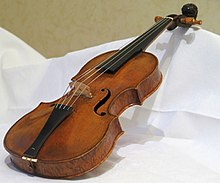The eternal sound
| Movie | |
|---|---|
| Original title | The eternal sound |
| Country of production | German Empire |
| original language | German |
| Publishing year | 1943 |
| length | 87 minutes |
| Age rating | FSK 14, 16 |
| Rod | |
| Director | Günther Rittau |
| script |
A. Artur Kuhnert Günther Rittau |
| production | EG Techow (manufacturing group) |
| music | Franz Grothe |
| camera | Willy Kuhle |
| cut | Alice Ludwig-Rasch |
| occupation | |
and Olga Engl , Liselotte Schaak , Eva Klein-Donath , Jack Trevor , Georg H. Schnell , Richard Ludwig , Kate Kühl : Listener | |
The Eternal Sound is a 1942 German feature film about violin making in Mittenwald . Directed by Günther Rittau , Rudolf Prack and Wilhelm Borchert play the leading male roles as violin makers. Olga Chekhova can be seen in the female lead on both sides .
action
The tranquil Bavarian town of Mittenwald on the northern edge of the Alps is the center of German violin making. The two fundamentally different brothers Berthold and the somewhat older Matthias have achieved considerable artistry. Matthias' dream is to one day build a master violin like the Stradivarius . Berthold doesn't have that much patience and neither does his brother's talent, but he knows a lot about playing the violin. One day Matthias returns from a trip to Innsbruck with a valuable Stainer violin . He wants to dismantle the precious instrument in Mittenwald in order to be able to recreate it perfectly. For the first time, Berthold saw the chance to be able to play an instrument of the highest quality, took the Stainer violin unceremoniously and disappeared in the night and fog to join the impresario Grundmann and the once celebrated singer Josephine Malti. Full of anger at the little brother's betrayal, the stolen Matthias Buchner remains bitter in Mittenwald. The Malti has not had much success for a long time and hopes that Berthold's masterly violin playing will bring her fame and recognition back. As a violin player, he has taken on the pseudonym Bertini and is celebrated by the audience as a virtuoso on the instrument. The latest tour even takes him to America.
There Berthold feels homesick for his old life and for Mittenwald. He also has a guilty conscience. Berthold needs some time to realize that for Josephine and Grundmann he was only a means and an end and that both of them instrumentalized him for their own ends. After several years abroad, Buchner returns to his native Mittenwald, where his brother Matthias has not made a single violin since then. For this he gave his heart to the very young Therese, a girl from the village. Love inspires Matthias, who does not welcome Berthold when he suddenly appears at his door, and he starts building a new violin. Matthias does not suspect that Therese, the daughter of the old journeyman Florian, has actually always waited for Berthold to return home and that Matthias does not reciprocate his feelings. Now that Berthold has returned home and his love has been taken from him, Matthias is devastated. Therese feels guilty about his state of mind and persuades the returnees to play the new Buchner violin for Matthias in a competition. Berthold wins first prize for Matthias, who has succeeded in creating a perfect replica of the Stainer violin. This victory leads to a reconciliation between the two brothers.
Production notes
Shooting began on August 2, 1942 (outdoor shots) and the end of September of the same year (studio shots) and ended in November 1942. Shooting took place in Kitzbühel and the surrounding area (outdoor shots) as well as in the Ufa city of Babelsberg and in the Ufa studio in Berlin. Tempelhof . The premiere took place on June 18, 1943 in German-annexed Strasbourg, the Berlin premiere was on July 15, 1943 in several cinemas in the capital.
EG Techow took over the production management. Artur Günther designed the film structures implemented by Willi Eplinius , Marie Luise Lohmann the costumes. Bruno Suckau took care of the sound, Kurt Schlawe took care of the still photos. Hans Müller was Rittau's assistant director.
Olga Chekhova's vocal parts were voiced by Elisabeth Schwarzkopf .
The production costs amounted to around 1,326,000 RM; by May 1944, 3,565,000 RM had already been earned. This made The Eternal Sound an overwhelming box office success.
The film received the Nazi rating “artistically valuable”.
The music titles "The Lark and the Violinist" and "Heimatlied" were played.
reception
The film service ruled: "Popular and heart-touching drama with musical delicacies."
For Boguslaw Drewniak this was “a culture film in disguise”.
Individual evidence
- ^ Ulrich J. Klaus: German sound films 13th year 1942/43. P. 134 (012.43), Berlin 2002
- ↑ ibid. 136
- ↑ The eternal sound. In: Lexicon of International Films . Film service , accessed December 26, 2019 .
- ^ Boguslaw Drewniak: The German Film 1938–1945 . A complete overview. Düsseldorf 1987, p. 447
See also
Web links
- The eternal sound in the Internet Movie Database (English)
- The eternal sound at filmportal.de
- short film excerpt
